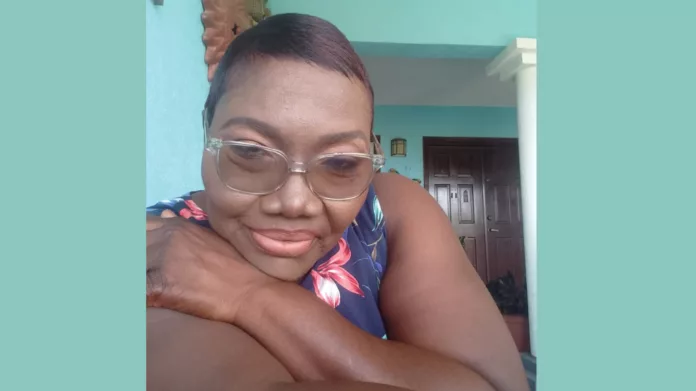By Barbara Arrindell
Barbara: Maxine, how and why did you get into journalism?
Maxine: My journey into journalism started before I knew the name of my profession. In fact, as far back as age four, I was fascinated by our family radio. I would sit beside it and mimic my radio icons, Ephraim John, Joan Samuel ,Hazel Michael-Martin, Mickey Mathew and Ruthlyn Roberts.
My mother would shake her head in amazement when I pretended to read the news or an obituary. At bedtime she would say, “Ok close the radio station now, and go to bed.”
When I was five, I asked her to teach me to spell radio. She told me that the word was too big for me but she spelled it anyway. I heard it that once and I never forgot my favourite five-letter word. There’s little wonder then at 16 and a half I persuaded the Silent Giant (Ivor Bird – manager at ZDK) to give me a job at his radio station.
It took two oral arguments and a reading test before I got my foot in the door. I worked for the first three months without getting paid but I was hungry for the experience. Working along with the likes of Louis Daniel, Garilyn Henry, Sly J and Al Jackson was priceless.
Barbara: And you also worked at ABS and Observer. What made you transition from journalism to education?
Maxine: Does it seem as though I’ve transitioned? I’m not sure that I have. Perhaps I’m still in denial but I still consider myself a journalist and still do a number of related things. However I experienced a very unfortunate political curve ball (or maybe it was a lime) which left me with a sour taste and that resulted in a shift.
I no longer want to be part of the day-to-day journalism practice in Antigua and Barbuda. Not to worry. I’ve turned my lemons into lemonade. The Maximum Reading Clinic was established.
Barbara: What exactly is the Maximum Reading Clinic? What do you do there? Why do people attend?
Maxine: Maximum Reading Clinic is a spinoff from a little project I experimented with about 20 years ago. One of my relatives was reading at what we nowadays call level four and I was adamant that I’d be his academic saviour.
I quickly realised that in the case of adults, cooperation has to be mutual. With my passion percolating, I turned my attention to helping others outside of my family. I started a programme I dubbed ‘success seven’. On my off days and evenings from the comfort of my home I coached seven adults and children in reading.
That went well until I migrated to the US. Examining my career options in the States forced me to lean towards what I felt comfortable with and what I felt passionate about. When I returned to my beloved Antigua I had an ‘Aha’ moment after completing an impact assessment study.
I realised that this was what I had come home to do. I still remain open to being involved in journalism in some way.
Barbara: You had the option of living elsewhere. Why did you decide to live here?
Maxine: Living in Antigua can be a bittersweet experience. I’ve lived in the United States and spent shorter stints in parts of Asia, Europe, Latin America and some islands of the Caribbean. So yes, I could have lived elsewhere, and perhaps someday I will when the bitter outweighs the sweet.
But there is a certain warmth that one gets in one’s own backyard that comes from not just the sunshine. I also believe that the drum of conviction to return home to help others was beating loudly in my intuition.
I think when I left, I needed that personal break – because let’s face it, some Antiguan experiences can be ‘gall bitter’ and leave you battered. So, you have to fight and run away if that’s what it takes. Now, having positioned myself to live to fight again another day, I’m satisfied that I’ve made the right decision to return home.
Seeing the smiles of individuals who once faced serious literacy challenges but now demonstrate vast improvements makes the return priceless. I also haven’t found the joy that I experience in the waters of Fort James Beach anywhere else.
Barbara: Having reported on activities in the nation for over 20 years, what is your assessment of our development?
Maxine: I visited another Caribbean territory for the first time not long ago and thought, my goodness Antigua isn’t that bad. However as far as development goes, we have a long way to go, like many other developing countries.
Here are some specific things that concern me. The state of our schools and the freedom that children seem to have to use marijuana is a major concern. The upsurge in youth violence sends some serious signals and threatens whatever development we have accomplished.
The state of St John’s city. Why are so many derelict and abandoned structures left to deteriorate around our capital? Why is the city in a perpetually unkempt state?
I’m concerned that we seem to have backpedalled in agriculture. Why can we only import garlic from China? If we bring a pack of garlic from the US, it is likely to be confiscated. That is indicative of a deeper issue.
I’m concerned about some state institutions and state representatives. Some seem almost comatose or seem unable to act or even pretend to act independently.
I cringe at what now passes for good broadcasting, because we fought so hard for the freedoms in so many ways.
I am pleased however to know that our education infrastructure has been bolstered by the UWI Five Islands campus.

